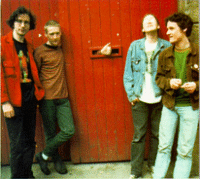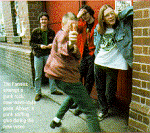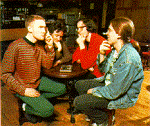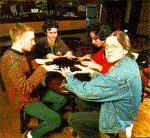TEENAGE FANCLUB
(Taken from Volume 7 CD/Magazine)
(Written by: John Harris, Photos by: Ian T. Tilton)
 Teenage Fanclub are about to spend two hours talking about the history of rock
- an exercise that will result in thrilling acknowledgements of the people who
turned them into would-be stars.
Teenage Fanclub are about to spend two hours talking about the history of rock
- an exercise that will result in thrilling acknowledgements of the people who
turned them into would-be stars.
But it will also see as many names ignored as saluted, leaving the chaps
lamenting the fact that they forgot to mention about 18 of their lifelong
heroes.
Of course, to give this chat a slight ring of authenticity, the conversation
should begin with Robert Johnson, Leadbelly or Blind Lemon Jefferson but,
seeing as time is tight, we may as well begin this slapdash biography of the
rock beast with...
Early American rock 'n' roll
Norman: "Out of all those people, I think my favourite is Buddy Holly.
I really like 'True Love Ways'; most people would talk about 'Peggy Sue' or
something, but that's a really well-structured, complex song - a real ballad.
It was the first record to be orchestrated, too."
Raymond: "Songs like that started the whole classy pop thing that
dominated the '60s: strings meeting rock 'n' roll."
Norman: "Little Richard's biography talks about Buddy Holly - about him
being a total womaniser, a rock 'n' roll animal. I prefer to picture him as
a real family guy. I don't believe Little Richard. Lying bastard."
Raymond: "We met Little Richard, actually - at the Hyatt Hotel in Los
Angeles. He walked up to our manager in the foyer, and we were asked if we
wanted to meet him. Our manager said, This is Teenage Fanclub from Scotland
and he said, Teenage Fanclub from Scotland? Woooooo!! That was our meeting
with him. Quite a big guy, strangely enough."
'Whaaat?' scream the purists, 'No Chuck Berry, Gene Vincent or Carl Perkins?'
Sadly not. The conversation soon flits across the ocean, to the strange
electrified take on early rock 'n' roll that was pioneered by....
Joe Meek
 Norman: "He was into spiritualism, and claimed that 'Johnny Remember Me'
was written by a dead person through a medium (Meek's acquaintance Geoff Goddard).
He also thought that he'd found a talking cat, so he recorded it. There's a tape
of him and this guy in a graveyard in London: They ask this cat all these questions,
and it just goes meeow, but he thought it was speaking to him. He was completely
off his rocker. Really cool, mind you."
Norman: "He was into spiritualism, and claimed that 'Johnny Remember Me'
was written by a dead person through a medium (Meek's acquaintance Geoff Goddard).
He also thought that he'd found a talking cat, so he recorded it. There's a tape
of him and this guy in a graveyard in London: They ask this cat all these questions,
and it just goes meeow, but he thought it was speaking to him. He was completely
off his rocker. Really cool, mind you."
So now you know. We go on to examine the legacies the Everly Brothers, the
entire Tamla Motown roster, the genius of Brian Wilson and the cataclysmic
rupture in the transatlantic pop balance that was caused by...
The British Beat Boom
Raymond: "Well, The Beatles were the first band to be influenced by
American R&B and write their own songs. Take "Please Please Me":
the way the harmonies are done, the song structure. After that, there's the
Who, the Stones, the Small Faces, The Kinks...there was an amazing amount going
on during that time."
Norman: "The band from later on who are never mentioned are The
Zombies. They had one hit: 'She's Not There'. Their best album is 'Odyssey
And Orace', which did nothing at the time, but is a total classic. It was
recorded immediately after 'Sergeant Pepper'. The songs are brilliant, the
production's brillliant, the orchestration's brilliant. You listen and just
think, Why wasn't that a hit?"
(Ironically, a track from this album, entitled 'Time Of The Season', went on to
sell a million, topping the charts in both the US and Japan after the band had
split - Ed with Big Rock Encyclopedia.)
Gerry: "I like The Creation. You never find them on 'Best Of The
Sixties' compilations because they were so underground - but they took what The
Who and The Kinks were doing in the mid-'60s, and because they were doing it
slightly later, they did it better. They did things in a psychedelic style,
but they had traditional song structures."
A-ha! The word 'psychedelic'. Gerry holds forth about how a lot of psych-rock
was merely the product of blues bores taking too many drugs (witness The
Doors), and how psychedelia's most inspiring product was the cross-pollinating
spirit that led The Byrds to flirt with country rock. Raymond interrupts with
a brief monologue about the eventual mutation of British hippies into
chest-beating apes (eg Black Sabbath), and we eventually fall into a series of
altercations about glam rock, reggae, disco, and stupid teenage crazes, the
highlights of which fall under...
The early to mid-'70s
Norman: "I like Mud, The Rubettes, Wizzard - it's all very nostalgic to
me because I grew up then. I mean, Top Of The Pops was great at that
time, wasn't it? And do you remember Kung Fu being on TV, and 'Kung Fu
Fighting' by Carl Douglas? All these guys at my school had their hair shaved
off because of that. Totally nuts. Actually, the '70s were fucking great:
like, Kojak was really popular then - so all these guys had their heads shaved
and used to walk around school with lollipops."
Gerry: "There was a guy at my school who got a Kojak cut in the winter.
His head kept going blue."
Lengthy guffaws are prompted by this anecdote. Having regained their
composure, the Fannies are enticed into a dewy-eyed salute to the magic of...
Punk Rock and the New Wave
Norman: "That was when I really got into music. I was really into The Clash,
Chelsea, The Cortinas...and I've got records by bands like the Cockney  Rejects and the Angelic Upstarts. The Buzzcocks were one of the best Punk bands:
they had the punk attitude, but they wrote great pop songs."
Rejects and the Angelic Upstarts. The Buzzcocks were one of the best Punk bands:
they had the punk attitude, but they wrote great pop songs."
Raymond: "What was weird about punk rock was the way that all the
people who bought 'Never Mind The Bollocks' had long hair and combat jackets.
They just thought it was a good traditional rock record."
Gerry: "I was into The Jam, and they got me into The Small Faces, The
Kinks and The Who. The Sex Pistols were a bit Stalinist, a bit year zero, but
Paul Weller would always talk about how 'Waterloo Sunset' was his favourite
record."
We then mull over why it all went a bit wrong. Sure, many of the crop of
post-punkers were cool, but it wasn't too long before Londoners were dressing
up as Highland clansmen and popularising the New Romantic palaver. It wouldn't
wash in Glasgow, however: anyone with any sense was camping out outside the
offices of Postcard Records and doffing their caps to...
Orange Juice
Norman: "I thought they were fucking brilliant. I was nuts on Orange
Juice; I saw them God knows how many times. I actually bought an original copy
of 'Falling And Laughing' last year for 40 quid; I just had to have it for the
collection. They brought a sense of humour back into music: I've got a bootleg
of a gig they did in London, where everyone was screaming, and Edwyn just says
(does impeccable impression), Calm down, we're not fucking Kajagoogoo!"
Arf arf arf! The Fannies then enthuse about the lasting influence of Postcard
on Glasgow, the fact that Orange Juice spawned a whole host of second-rate
imitators who interpreted Edwyn Collins' love of Al Green as a call to make
crappy codsoul and be signed to cynical major labels, The Smiths (Brendan has
always been annoyed by Morrissey's voice; Raymond is a dyed-in-thewool-fan),
The Weather Prophets and...
Felt
This is a particularly crucial part of the interview: 'Belt', the instrumental
track the Fannies have donated to Volume , is inspired by the
epochmaking '80s indie stars.

Norman: "Felt were excellent. They started at the same time as the
Postcard thing. I first heard them on John Peel, and I thought they were
amazing. I went out and bought some records straight away. 'Belt' is a Felt
tribute song, played on a Yamaha QY-20 keyboard, which is the same size as a
video cassette. Brendan did most of it."
Next: The Membranes, early rap, and the Manchester-based insurrection that
desperate journalists called...
Baggy
Gerry: I didn't like it at the time, but I've got The Stone Roses album
now. I've listened to it over the last year, and it's a great record."
Raymond: "It was strange that Happy Mondays were around for ages before
anything happened. They'd play in Glasgow, and no one would go to see them,
and then they were suddenly massive."
Brendan: "Aye, but I doubt they noticed."
Ha ha! Underpinning the explosion of baggy music was the UK's sudden enthusiasm
for nightclubbing, Smiley T-shirts, and recreational drugs. The Fanclub
witnessed all this from the bars of Glasgow clubs and the sofas of friend's
flats, gaining masses of voyeuristic entertainment from the mushrooming of...
Housey-Housey dance music
Raymond: "If you're in Glasgow and you want a drink late at night, you
go to a club. So you'd go to a club where they were playing that stuff, and no
one was into it; these places were really empty. Then over about two weeks, it
was suddenly massive, and thousands of people were walking around Glasgow  wearing bandanas and tie-dye shirts."
wearing bandanas and tie-dye shirts."
Brendan: "I remember being at a friend's house, getting drunk and
listening to music, and her sister came in with her pals; all these mad guys
dressed exactly the same as they'd been a couple of weeks before jeans, denim
shirts - tripping off their nuts, putting on all this weird music. That was
the first time I experienced it - and after that I lived the life for about a
year and a half. Actually, my girlfriend's wee sister had her seventh birthday
party, and her mum said to her, Show Karen and Brendan how you rave, and she
started doing all this mad dancing. I mean, a seven-year-old kid raving;
that's fucking outrageous."
The Fannies go on to talk about the progress of the American underground, the
new breed of crusty troupes, 2 Unlimited, East 17, the Thompson Twins, The
Pastels...and then Norman is struck by the fact that he's committed countless
revisionist heresies. "We haven't mentioned Big Star," he half-sobs. "Or the
Flying Burrito Brothers. Christ, we haven't even mentioned Bob Dylan..."
A Catholic Education (Paperhouse PAPCD004) 1990
On the heels of their classic debut 45, 'Everything Flows', came this patchily
brilliant, endearingly shambolic debut that forged their reputation as prime
UK flagbearers of the barely christened 'grunge' movement. Somewhat sprawling -
and featuring the dubious conceptual 'Heavey Metal' instrumentals - it
nevertheless boasted at least a couple of corkers to add to the single in
'Too Involved' and 'Don't Need a Drum'. As debuts go, pretty damned impressive
and sales piled on to prove to point.
The King (Creation CRECD 096) 1991
 'Poor' would be a generous verdict to return on this. A collection of pointless
instrumentals and slightly less pointless vocal takes, the highlight was a faithful
but unilluminating cover of Madonna's 'Like a Virgin'. Assembled as a contractual
obligation filler for their US label, Matador (who, ironically, rejected it,
consequently to see it turn up in the States as an expensive import), The
King was far from fit to share a handle with Elvis. Now withdrawn.
'Poor' would be a generous verdict to return on this. A collection of pointless
instrumentals and slightly less pointless vocal takes, the highlight was a faithful
but unilluminating cover of Madonna's 'Like a Virgin'. Assembled as a contractual
obligation filler for their US label, Matador (who, ironically, rejected it,
consequently to see it turn up in the States as an expensive import), The
King was far from fit to share a handle with Elvis. Now withdrawn.
 Bandwagonesque (Creation CRECD 106) 1991
Bandwagonesque (Creation CRECD 106) 1991
Grumpy old buggers like me think they'll never better 'Everything Flows" but
this second album 'proper' is a pretty good attempt at silencing doubters.
It's more carefully formed than its predecessor and, from pithy presentation
to cuts like 'The Concept', 'Star Sign', and, best of all, 'Alcoholiday',
sheds almost completely the shadow of Dinosaur Jr. while cementing their
stature not only as ace sound sculptors but also as songsmiths of
distinction. RG

 Teenage Fanclub are about to spend two hours talking about the history of rock
- an exercise that will result in thrilling acknowledgements of the people who
turned them into would-be stars.
Teenage Fanclub are about to spend two hours talking about the history of rock
- an exercise that will result in thrilling acknowledgements of the people who
turned them into would-be stars.
 Norman: "He was into spiritualism, and claimed that 'Johnny Remember Me'
was written by a dead person through a medium (Meek's acquaintance Geoff Goddard).
He also thought that he'd found a talking cat, so he recorded it. There's a tape
of him and this guy in a graveyard in London: They ask this cat all these questions,
and it just goes meeow, but he thought it was speaking to him. He was completely
off his rocker. Really cool, mind you."
Norman: "He was into spiritualism, and claimed that 'Johnny Remember Me'
was written by a dead person through a medium (Meek's acquaintance Geoff Goddard).
He also thought that he'd found a talking cat, so he recorded it. There's a tape
of him and this guy in a graveyard in London: They ask this cat all these questions,
and it just goes meeow, but he thought it was speaking to him. He was completely
off his rocker. Really cool, mind you."
 Rejects and the Angelic Upstarts. The Buzzcocks were one of the best Punk bands:
they had the punk attitude, but they wrote great pop songs."
Rejects and the Angelic Upstarts. The Buzzcocks were one of the best Punk bands:
they had the punk attitude, but they wrote great pop songs." wearing bandanas and tie-dye shirts."
wearing bandanas and tie-dye shirts."
